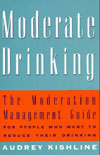Introduction, Audrey Kishline's Moderate drinking: The Moderation Management guide for people who want to reduce their drinking New York: Crown, 1996
Introduction to Moderate Drinking
Stanton Peele
 Drinking beverage alcohol is usually a positive experience. Most adults who drink do not harm themselves with alcohol, yet even though negative drinking is a minority of all drinking, it has become a preoccupation among Americans. Most often the form this preoccupation takes is the belief that this or that person is an alcoholic: out of control, diseased, never able to moderate, and in denial.
Drinking beverage alcohol is usually a positive experience. Most adults who drink do not harm themselves with alcohol, yet even though negative drinking is a minority of all drinking, it has become a preoccupation among Americans. Most often the form this preoccupation takes is the belief that this or that person is an alcoholic: out of control, diseased, never able to moderate, and in denial.
This image is just as erroneous as the idea that all drinking is bad. Most problem drinking occurs among people who do not meet the basic criteria for alcoholism. In fact, the greatest growth in alcoholism labeling targets a group which almost never qualifies as alcoholic—adolescents.
We need to confront the myth that any drinking problem requires inpatient treatment, a disease diagnosis, and lifetime abstinence. People have been moderating their drinking patterns on their own for a lot longer than any of the support groups or treatment programs have been around. Usually they do so as they grow older, mature, and accept life's responsibilities. Moderation Management is an effort to harness this common process of self-management and moderation by recognizing that even though most people "mature out" of their drinking problems by themselves, some may want or need additional help in a support group setting.
Moderation Management (MM) shows us that there is still room in the world for people to tackle problems on their. Human beings can decide for themselves what will make them happiest and will work best for them. MM doesn't diagnose people or tell them what they must do. The group recognizes that, ultimately, people must do this for themselves.
It is a pleasure to see in America the birth of a noncoercive, common-sense, practical support group devoted to helping people with histories of problem drinking. MM helps them by leading them along the most common path in history—the path of self-discovery, self-improvement, self-determination, and self-management.





